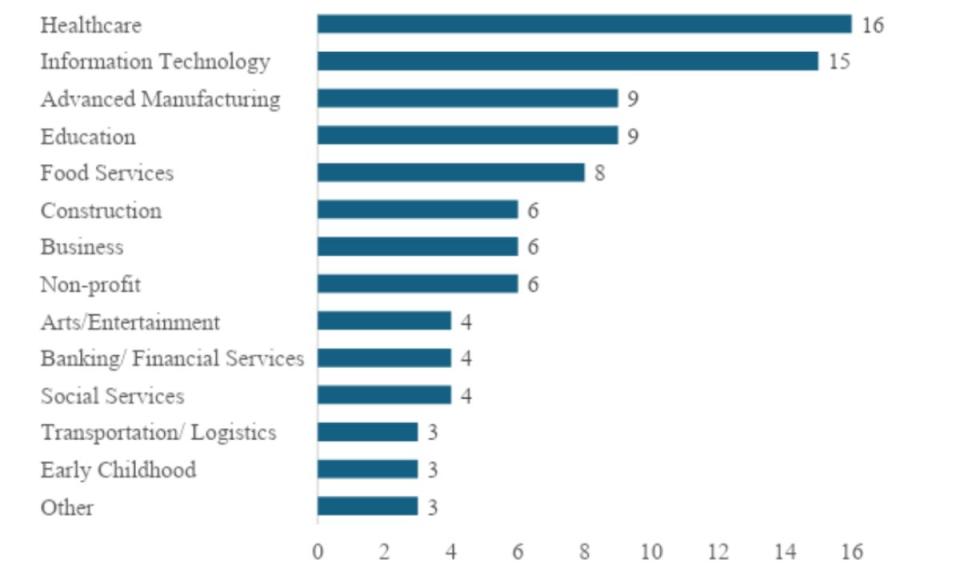
Employers and Education: A Disconnect in Workforce TrainingEmployers and Education: A Disconnect in Workforce Training Employers often lament the scarcity of qualified candidates for open positions, while education and training providers struggle to understand the specific skills required by the workforce. As a result, workforce training programs have failed to meet the needs of both workers and employers. Innovation in Workforce Development To address this issue, philanthropic investors can play a pivotal role by demanding that non-profit organizations partner with employers to make written commitments to provide full-time employment to underserved youth. These commitments should be based on objective criteria, such as completion of training milestones or demonstration of necessary skills. Heckscher Foundation Challenge The Heckscher Foundation for Children spearheaded a transformative initiative known as the Heckscher Foundation Challenge. This challenge invited New York state and city colleges and non-profit organizations to submit proposals, with employer partners, for meeting workforce needs. The challenge required employer partners to commit to hiring in writing. Overwhelming Response and Diverse Participation The call for proposals garnered an overwhelming response, with nearly 100 submissions. The proposals came from a diverse range of organizations, including community-based organizations, established workforce programs, and industry-specific training programs. Employer partners also represented a wide spectrum of industries and business sizes. Emphasis on Industry Involvement Despite the positive response, the challenge highlighted the need for increased involvement from certain industries, particularly financial institutions. Employers from these industries are encouraged to re-evaluate their partnership models and adopt a more direct and active role in talent development. Impressive Results and Ongoing Progress As of June 2024, the majority of participants in the Heckscher Foundation Challenge programs are on track to meet their training and hiring commitments. Over 180 young people have completed training, with 98% earning industry-relevant certifications or passing required licensure exams. Furthermore, 98% of these individuals have secured full-time jobs with employer partners, and 80% have maintained their employment for at least three months in industries with traditionally high turnover rates. The Importance of Employer Commitments By funding programs that do not include job commitments from employers, philanthropic investors miss a crucial opportunity to catalyze transformative change. These commitments are essential for driving deeper organizational and community involvement, fostering lasting progress in employment practices, and empowering marginalized individuals. Conclusion The Heckscher Foundation Challenge demonstrates the transformative power of employer commitments in workforce training. Philanthropic investors can play a significant role in promoting equity and economic empowerment by demanding such commitments and fostering partnerships that truly meet the needs of workers and employers.

Employers often complain about how difficult it is to find talent for open positions or how education and training programs must better align to workforce needs. Meanwhile, education and training providers experience a general lack of clarity from employers on the skills necessary to secure employment. Taken together, this means workforce training programs have fallen short for both workers and employers. Innovation is needed to meet current and future talent needs.
Philanthropic investors can shift this paradigm by demanding that nonprofits partner with employers to make written commitments to underserved youth to provide full-time employment based on objective criteria, such as satisfactory completion of training milestones or other proof of mastery of necessary skills. Too often, employer partnerships — particularly involving young people who are out of work or not enrolled in school — carry minimal expectations for significant employer investment or involvement, allowing companies to benefit from training programs that do the heavy work of talent acquisition and development without having to make tangible contributions to those efforts. Funders must require more than superficial employer partnerships that offer little beyond internships and minimal direct involvement.
Heckscher Foundation for Children led such a paradigm shift with financial support for a first-of-its-kind workforce program using two-year grants to increase employer investment and commitment in talent development. Through the Heckscher Foundation Challenge, New York state and city colleges and nonprofit community-based organizations were invited to submit proposals, with employer partners, for meeting workforce needs in the state and boosting employment and earnings outcomes for young adults under 25 years of age. The application process required employer partners to commit to hiring, in writing.
Get stories like these delivered straight to your inbox. Sign up for The 74 Newsletter
The call for proposals in June 2023 was a resounding success; Nearly 100 were received from across the state, culminating in a total of $7.6 million in support to 20 grantees and their employer partners. These range from community-based organizations such as Commonpoint Queens, The Door, East Side House, Henry Street Settlement, JCC of Staten Island and Say Yes Buffalo to established workforce programs like NPower, St. Nicks Alliance and Wildcat Services and specific industry training programs such as Covenant House, Drive Change, Hot Bread Kitchen and Reel Works. The roster also includes three City University of New York colleges, three SUNY State University of New York colleges and one high school dedicated to career and technical education.
Story continues
Along with the nearly 100 proposals came 234 employers that submitted letters committing to guarantee hires. They are geographically diverse, representing the entire state of New York, from New York City to rural locations. Employers were also diverse across industries and business sizes, ranging from companies with 10 or fewer employees to multinational corporations with over 90,000 workers. However, not all industries were represented, or on the leading edge of talent development, and there was limited involvement from several prominent New York industries, such as financial institutions. While the employer response to the Heckscher Foundation Challenge is to be commended, it should serve as a call to action for employers and industries that have yet to shift their partnership paradigm to a more direct and active role.
Industries encompassing applicants to the Heckscher Foundation Challenge:

Number of proposals received, by industry. “Other” includes pet grooming, agriculture and law enforcement (Heckscher Foundation Challenge)
The foundation required all grantees’ applications to detail short- and long-term outcomes that the youth would accomplish to show how those goals would be carefully tracked and reported on through quarterly status calls. As of June 2024, the one-year anniversary of the grants, the majority of participants are on target to meet their training and hiring commitments. While some of the programs are still ongoing, with young people continuing to sign up or still working to complete their training, several have already seen multiple cohorts finish. Thus far, over 180 young people have completed training, with 98% earning industry-relevant certifications/credentials or passing required licensure exams. In addition, 98% of them secured full-time jobs with employer partners, with an 80% preliminary three-month retention rate in jobs that traditionally experience high turnover, such as food services.
To view the grantees and their employer partners, please visit the Heckscher Foundation Challenge training partners and employer partner webpages.
By funding programs that do not include job commitments from employers, philanthropic investors miss a critical opportunity to catalyze deeper, transformative change within organizations and the broader community. Without these higher standards, philanthropic funds are underutilized, perpetuating cycles of inequity, underemployment and minimal impact rather than fostering genuine, lasting progress in employment practices and community empowerment.
Disclosure: The Heckscher Foundation provides financial support to The 74.